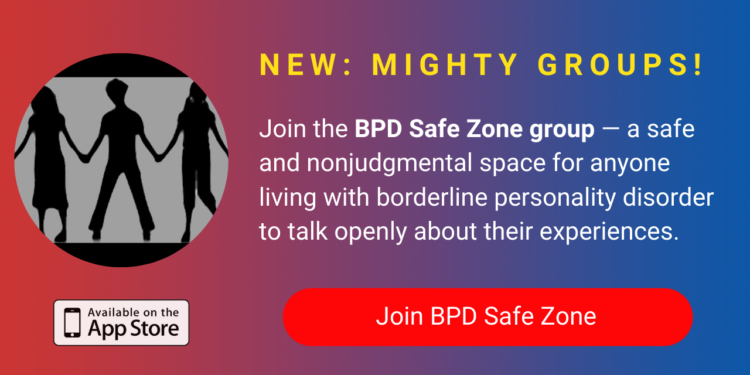A Plea to Providers: What Borderline Personality Disorder Clients Wish You Knew
A few years back I was asked by my psychiatrist, the same one who gave me the idea for my superhero article, to collaborate with him on an article to be published in a doctor’s academic journal. The article would be from my perspective as a borderline personality disorder (BPD) patient offering advice to doctors on how to treat people with BPD more effectively. I was deeply honored, especially as a validation of me as a writer. Though we were very proud of the article it sadly didn’t end up being published. My therapist broke the rejection news to me with a pained look on his face, worried about how I would respond. Moved by the compassion I could see in his eyes, I put on a brave face.
This was two years ago now and so much has happened since including moving to a new city which ended my relationship with my therapist. I thought now was the time for our article to see the light of day by sharing it with the Mighty community. No doubt, if all of you were to write an article aimed at improving how they treat people with your mental illness, then there would be many more impassioned and different points to mine. I have updated some of the article and entirely deleted my therapist’s section, which was background on BPD itself, because it is impossible to credit him as a co-author here. However I have kept his following sentence which introduces my section:
The following account by an articulate BPD sufferer, offers salient advice for doctors who may wonder sometimes (or often) what their BPD patients want them to know and do.
1. Make an accurate diagnosis early.
If I could go back to my first breakdown in my early 20s and speak again with my first psychiatrist, I would ask one question: although you made an accurate diagnosis of depression, surely my catastrophic overreaction to failure, intense idealizations, repeated self-harm, suicidal ideation, overwhelming emptiness and identity confusion met criteria for BPD. I fantasize about how better my life would be if I had a correct diagnosis of BPD at a much earlier stage.
Doctors must remember that we are as individual as the rest of humanity. Within BPD, personalities vary greatly, thus manifestations of symptoms are immensely varied. It is vital not to cling to assumed stereotypes about BPD (such as the angry, prickly, manipulative shrew), but to meticulously apply diagnostic criteria. Of course, it is easy for me to say this as a non-psychiatrist, and as someone who was misdiagnosed for so long. But I believe my delayed diagnosis was due to internalized stigma held by my earlier treating doctors, and their reliance on assumed BPD stereotypes, some of which are not diagnostic criteria. I did not fit their BPD stereotype presumably because I was male, lacked manipulative behaviors and expressed anger internally against myself instead of externally against others. It was only in my mid-30s when I had a sensitive, kind and intuitive psychiatrist that someone finally looked beyond the “nice” facade I subconsciously presented, and clearly appreciated the depth of my emotional pain. It is no coincidence that the psychiatrist who correctly diagnosed me, where three had failed previously, had an immediate positive emotional connection with me.
2. Show empathy and compassion.
First and foremost, doctors need empathy and compassion for their patients as many are in deep pain. Professional boundaries are needed to prevent compassion fatigue and negative countertransference. However, I cannot overstate how much pain we are in at times. The pain of my intense, labile emotions, overwhelming sense of abandonment-rejection and the very empty core around my identity can be so devastating that self-harm and death by my own hand can seem like the only option. While I rarely project this overwhelming agony, a number of patients do in angry outbursts including lashing out at their doctors. This is understandably distressing for doctors and I would find it hard not to personalize such criticism if I were in your shoes. The important thing: never lose empathy for the pain people are in. Pain is too gentle a word, it is sheer agony with an often violent urge to die. Please be very careful with your language, especially do not use pejorative language and do not lash out in response to your patient’s anger, but instead express validation for their struggles.
I would also advocate for developing your borderline client’s compassion and empathy for you yourself. This is potentially risky terrain but if your client can come to view you as a fallible, real human being who is doing the best you can then this could help make the therapeutic relationship truly therapeutic. I am not suggesting that every therapist should expose their vulnerabilities and rip open their character flaws. It is rather not being afraid to apologize if you are having a difficult, tiring day, which my past two therapists have been honest to admit. And if a therapist unintentionally says something that makes their borderline client react strongly and head towards devaluation then a simple, genuine apology can really help de-escalate the devaluation. In the end, empathy and honesty can create a safe space for the patient to feel heard and understood which in turn makes it easier for them to unburden their heavy loads.
3. Validate.
Generally, the more caring and validating your manner; the more emotionally engaged, the less detached you are, the more likely your patient will trust you and show their real emotional self. Doctors must have professionalism as per their code of conduct, to protect themselves and their patients as obviously transference can be a frequent obstruction when patients embark upon trust and connection with their doctor. Further fueling this potential transference is the BPD tendency to split between idealization and devaluation within relationships and the intimate disclosures of a therapeutic relationship can really accentuate or exacerbate the splitting. But even this is an opportunity for patients to use new skills in healthier, more dialectic ways of relating. Genuine care and validation results in patients gaining trust and being free to be authentic. In my view BPD is primarily a disorder of interpersonal emotions so a doctor who shows genuine emotion within professional boundaries is likely to further allow a safer space for the patient. This provides impetus for the process of healing and a movement towards hope. Undoubtedly, each patient interacts in a different way with each doctor, just as in all human interactions, nevertheless your validation is imperative.
This exact validation lies at the foundation of the main BPD therapy dialectical behavior therapy. Its founder Marsha Linehan explained in her recently published memoir that it was developed specifically in “a combination of a human touch (close, genuine relationship between therapist and client) with practical skills that help the client navigate every aspect of his or her daily life. DBT puts heavy emphasis on treating clients as equals and not viewing them as somehow damaged goods who need to be coddled –… fragilizing them. Clients are validated for who they are.” Marsha also wrote the DBT manual in a personal rather than academic voice removing any unhelpful medical jargon. If the therapy with the most evidence-based effectiveness in treating BPD is rooted in validation then that reveals how crucial it is for us.
If you can validate, you will do more than just diagnose and medicate, you will cultivate a meaningful therapeutic relationship and connection. From this connection you offer a reason for the patient to hope and keep going.
4. Perseverance.
It is often a lifelong road for both client and therapist; it is a marathon, not a sprint. There will be some very high highs with heartening signs of connection and progress, but also some sessions where everything will be life or death, devaluation and may end in hospitalization for your patient. The therapist to patient relationship is often not easy, but just as we must be resilient with our brutal disorder, you must persevere even when it feels like you’ve reached the end. Keep on keeping on! We’re in this together and we must pick ourselves up for the benefit of others including our treating doctors.
As abandonment is arguably at the very centre of our disorder, I would encourage practitioners not to discard their BPD patients without warning and the safety net of a referral to another reputable psychiatrist. But it is possible for a therapeutic relationship to end happily and fruitfully as I can attest when I recently moved cities. The final session was dreaded and catastrophized in advance, but we both made it clear how life-changing and saving this therapeutic relationship had been for both of us, and then life went on.
A tiny spark of kindness. A pebble on the side of the road.
The best way I can conclude is in the words of Kay Warren, wife of Saddleback Church founder Rick Warren, but more importantly mother of a son Matthew who lived with BPD, which tragically led to his suicide in 2013. Since her son’s death, Kay has become a passionate advocate for mental health awareness, bringing hope into places of wrenching despair through her searing personal experience. In November 2014, Kay spoke at the 19th UCLA psychiatry and psychopharmacology conference where she powerfully articulated much of the above advice to doctors when asked what mental health providers should be doing differently:
“Be compassionate…Matthew talked to so many people; maybe they cared, maybe they were tired, maybe they were burned out themselves, maybe they had talked to their fifteenth person that day and had nothing left to give to him. But the people that helped him in all those years of therapy were the few people who related to him with compassion, who validated his suffering. The people that talk to you that are feeling suicidal… they are in agony. They are in torment. And to be able to validate their suffering to tell them that you hear it, that you feel it, that you care… But that tiny spark of human kindness, of compassion goes so far for a person who is feeling very unattached, unconnected, disconnected from the human race, sometimes all of humanity. …When you feel that disconnected and that unattached to have someone make that bond with you is a powerful healing…If in that moment you have established that bond of one human being to another human being that there is somebody on the face of the earth who gets you, even if it’s just a momentary experience, has to be one of those pebbles on the side of life is good and I can keep going on even if it is just for another hour.”
If you live with borderline personality disorder, what do you wish mental health professionals understood? Let us know in the comments below.
Getty image via Benjavisa


